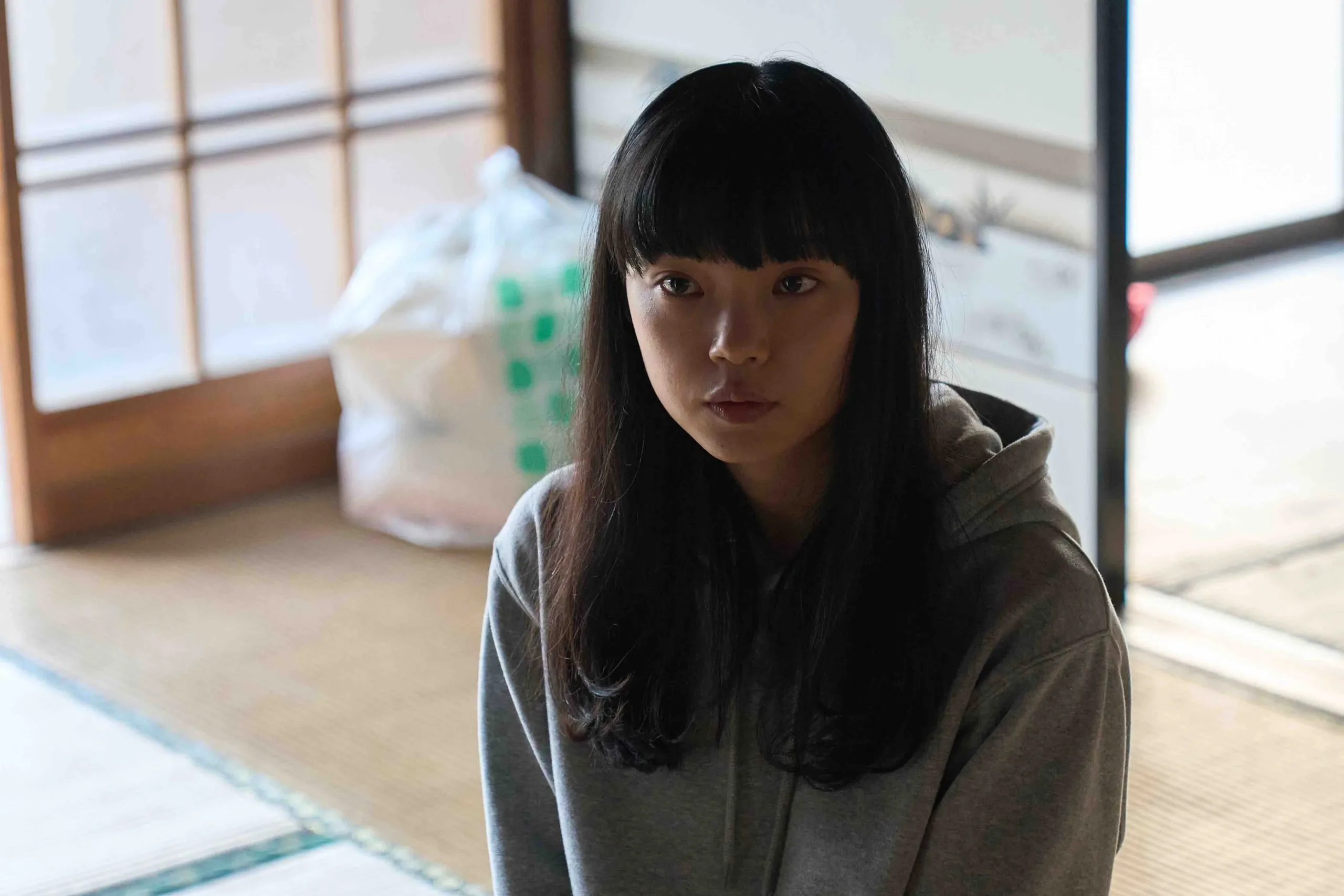A young nursing student, portrayed with a radiant sincerity by Kotone Furukawa, departs Tokyo for the countryside. Her purpose is a visit to her grandparents, a simple act of care that aligns with her chosen path of helping others.
The setting that receives her is one of bucolic tranquility, a world of verdant fields and quiet tradition that seems a perfect antidote to the city’s hum. Yet, a shadow tails her. A recurring nightmare, a fragment of childhood memory tied to this very house, injects a faint but persistent poison into the pastoral scene.
This sense of foreboding, a feeling she cannot quite name, hangs in the air. The film establishes its serene world only to suggest, with unnerving subtlety, that the ground beneath is unstable. Her idealism is a lantern carried into a space that is growing darker with each step, preparing for a confrontation with something far more unsettling than a bad dream.
Cracks in the Facade
The initial strangeness is easy to dismiss. Her grandparents, doting and gentle one moment, slip into inexplicable states the next. During a meal, they erupt into synchronized, guttural animal noises. The grandfather freezes, mouth agape, staring into nothingness with a terrifying vacancy.
The protagonist attempts to file these episodes away as the unfortunate effects of age, the sad decay of once-sharp minds. Her rationalizations become harder to sustain as she hears disturbing sounds from a locked room on the second floor. The film builds its tension not with sudden shocks but with the steady accumulation of the bizarre.
The facade of normalcy finally shatters when she uncovers the source of the noise: a person, held captive. Her terror is absolute, but it is her family’s reaction that delivers the true horror. When her parents and brother arrive, they greet the appalling discovery not with alarm but with a quiet, sheepish nonchalance. Their casual acceptance confirms her deepest fear: she is utterly alone in a nightmare they have all agreed to live in.
An Economy of Misery
The secret, once revealed, reframes the entire world. Happiness in this community is not an emotion to be cultivated but a resource to be extracted. It is a finite commodity, and for one family to possess it, another individual must be stripped of all contentment and subjected to unending suffering.
This cruel arithmetic is not a private perversion but the fundamental law of the land, an ancient and accepted social contract. The protagonist sees that every cheerful face in the town, every peaceful home, is sustained by a hidden misery. The film introduces a young farmer, a fellow outcast who appears to exist outside this devilish pact, offering a sliver of potential alliance in a world built on sanctioned cruelty.
The story operates as a potent allegory for a society that demands conformity and a polished exterior. It poses a chilling question about the foundations of our own comfort, suggesting that prosperity is often built upon systems of exploitation we simply choose not to see.
The Aesthetics of Dread
Director Yûta Shimotsu constructs this horror with a surgeon’s steady hand. The film’s power comes from its deliberate, unhurried pace, which allows a profound sense of dread to steep. The cinematography is cool and composed, capturing the grotesque events with a placid gaze that makes them feel all the more disturbing.
A string-heavy score pricks at the edges of the calm, signaling a rising panic that the characters refuse to acknowledge. The supporting cast’s deadpan delivery is key, their matter-of-fact cruelty making the horror feel chillingly bureaucratic.
At the center of it all is Kotone Furukawa’s performance. She masterfully charts her character’s painful evolution from a wide-eyed caretaker to a person forced to witness the terrible lie her entire existence is built upon. The film leaves a lasting stain not through spectacle or scares, but through the queasy persistence of its central, awful idea.
Full Credits
Director: Yûta Shimotsu
Writers: Yûta Shimotsu, Rumi Kakuta
Producers: Takashi Shimizu, Atsushi Igarashi, Chikako Nakabayashi, Tsuyoshi Kobayashi
Executive Producers: Takashi Shimizu
Cast: Kotone Furukawa, Masashi Arifuku, Aine Hara, Kôya Matsudai, Yoshiko Inuyama, Hirofumi Nishida, Shiho Yoshimura, Kazuo Hashimoto
Director of Photography (Cinematographer): Ryuto Iwabuchi
Editors: Yûta Shimotsu
Composer: Yuma Koda
The Review
Best Wishes to All
A chilling and methodical parable, "Best Regards to All" succeeds through its unnerving atmosphere and potent social critique. It forgoes jump scares for a slow-burn dread that burrows deep, anchored by a masterful lead performance. While its deliberate pace may test some viewers, its allegorical power and queasy, lasting impact mark it as a significant and deeply unsettling piece of modern horror.
PROS
- Potent allegorical depth and sharp social critique.
- Masterfully builds a slow-burn, unsettling atmosphere.
- A strong, transformative lead performance by Kotone Furukawa.
- Confident, methodical direction and a distinct visual style.
CONS
- The deliberately slow pacing might alienate some viewers.
- Certain surreal scenes feel more abstract than purposeful to the narrative.
